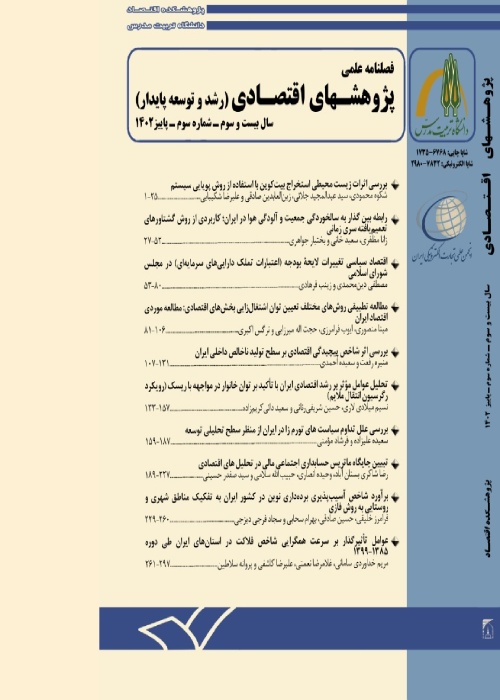The Effects of Sanctions and Oil Revenues on Exchange Rate Pass-Through
Exchange rate pass-through (ERPT) is one of the most important indicators for monetary policymakers that shows the impact of exchange rate volatility on price indices (such as CPI, PPI, etc.). The economic stability and inflation environment are two factors affecting ERPT. The lower the inflation environment, the lesser the ERPT. In an oil-exporting country, the long-run situation of oil revenues can be a state variable of the economy and affect the expectations of economic agents. Therefore, the purpose of this study is to investigate the effect of sanctions against Iran and oil revenues situation on the ERPT from 1990Q2 to 2021Q1.
Regarding the implementing date of sanctions (2012Q1), the sanction period is from 2012Q1 to 2021Q1. Considering Lucas' critique, the switching models are not appropriate, and separated models are preferred. Therefore, by using the Bai-Perron (2003) method and taking oil revenues as a state variable of economy, the rest of the period is separated into two periods. The first period (from 1990Q1 to 2000Q4) is the phase of shortage in oil revenues and the second period (from 2001Q1 to 2011Q4) is the phase of abundance in oil revenues. The inflation environment during sanctions and shortage in oil revenues was high, and it was low in the period of abundance in oil revenues. The ERPT for each period was calculated using the Structural Vector Autoregressive (SVAR) model. Oil price gap is the exogenous variable and the endogenous variables are respectively as follows: USA GDP, USA CPI, domestic GDP, exchange rate, liquidity and domestic CPI. All variables are in the first difference of logarithmic form. The Cholesky decomposition were used. The optimal lags for each model were selected by Hannan-Quinn information criterion (HQ), Akaike information criterion (AIC) and Final Prediction Error (FPE).In this model, ERPT is the ratio of the accumulated response of CPI to exchange rate structural shock. ERPT=k=1nDLCPIkk=1nDLEXk (1)To investigate the effect of endogenous variables shocks on domestic CPI, variance and historical decomposition are used. Finally, the autoregressive trend of imports for each period is calculated to explain the status of imports versus different oil revenues. These equations can explain the dependency of CPI to imports.
Only the ERPT in the sanctions period has a long-run effect on the economy. This effect is about 43%. The ERPT is 9.9% for the period of shortage in oil revenues, 25.1% for the period of abundance in oil revenues and 10.1% for the sanctions period. Unlike most previous studies, the results show that the lower the inflation environment, the higher the ERPT, and the higher the inflation environment, the lower the ERPT. The main cause of these unexpected changes in ERPT is related to share of imports in consumption basket. The import trend, either in the sanctions or the shortage oil revenues period, was decreasing while in the abundant oil revenues period, was increasing.The results of the variance and historical decomposition show that in the period of sanctions, the exchange rate structural shocks have the largest share in inflation shocks, while in the other two periods, the inflation structural shock has the largest share in inflation shocks.
The central bank of Iran is using the nominal exchange rate as an anchor to limit inflation and, finally, increase the monetary policymaker's credibility. In Iran, increasing oil revenues leads to implementing the crawling peg exchange rate system instead of the managed floating exchange rate system, and consequently, not only the PPI inflation will be greater than the imported goods inflation, but also the imports will increasingly grow. Therefore, it is expected that the share of imports in the consumption basket grows and CPI will be more sensitive to imports. These results can explain the ERPT changes.In order to increase the credibility of the monetary policy maker and reduce the ERPT sensitivity to oil revenue situations, instead of using the nominal exchange rate anchor, the central bank should be more independent, commit to implementing monetary policy. So, according to the real sector of the economy, the central bank should announce its goals in the short-run and commit to them and announce the status report at the appointed times, and in the medium run, the central bank should pursue only its goals implicitly and increase its credibility among economic agents by making the economy more predictable. The more independent the central bank is, the easier it will be to follow the above policy.
- حق عضویت دریافتی صرف حمایت از نشریات عضو و نگهداری، تکمیل و توسعه مگیران میشود.
- پرداخت حق اشتراک و دانلود مقالات اجازه بازنشر آن در سایر رسانههای چاپی و دیجیتال را به کاربر نمیدهد.


